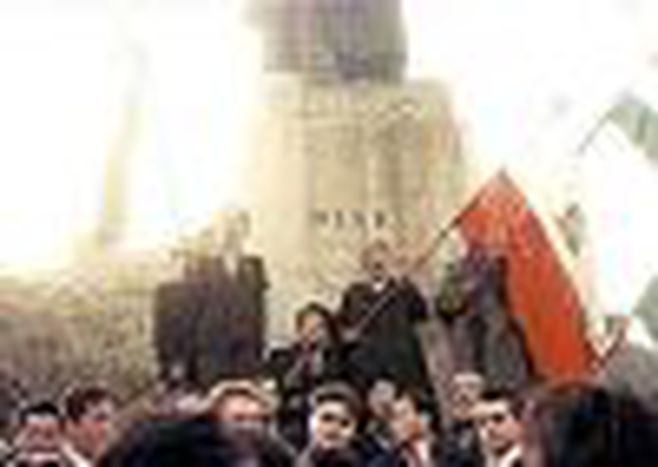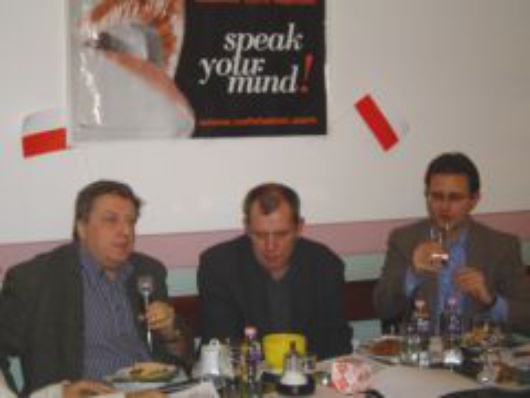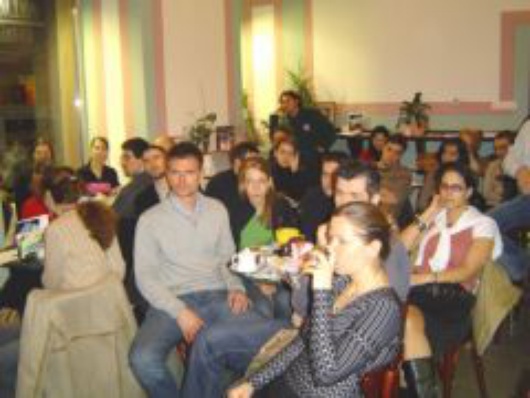
Poland’s Role in Europe (1956-2006)
Published on
On the occasion of launching the new, polish language version of cafebabel.com, the Budapest team organised a debate in Café Pollack on 16 Febuary 2006. One who called around the Café did not have to be a specialist to understand the three guest speakers’ debate about Poland or to take part in the ensuing question and answer session. The event was supported by the Polish Institute in Budapest.
 “Poland is one of the big winners of the 20. century” – was the opening remark of Péter Tálas, the head of the Strategic and Defense Research Centre ZMNE. He went on to explain that it was the end of the First World War that put an end to division and foreign rule for this nation that has always boasted a „Western” identity, despite being firmly entrenched in the „Eastern” part of Europe. The unity of the Polish society was formed by a series of recurrent crises (1956, 1968, 1970, 1976, 1980), up to the point where the working classes finally joined forces with the intelligentsia and were thus able to stand up to the repressive communist rule. These efforts to create a European democracy have resulted in the peaceful change of regime of 1988 that was negotiated and not fought, and the creation of a real political opposition – possibly the only one in Eastern Europe.
“Poland is one of the big winners of the 20. century” – was the opening remark of Péter Tálas, the head of the Strategic and Defense Research Centre ZMNE. He went on to explain that it was the end of the First World War that put an end to division and foreign rule for this nation that has always boasted a „Western” identity, despite being firmly entrenched in the „Eastern” part of Europe. The unity of the Polish society was formed by a series of recurrent crises (1956, 1968, 1970, 1976, 1980), up to the point where the working classes finally joined forces with the intelligentsia and were thus able to stand up to the repressive communist rule. These efforts to create a European democracy have resulted in the peaceful change of regime of 1988 that was negotiated and not fought, and the creation of a real political opposition – possibly the only one in Eastern Europe.
Mr Pál Tamás, director of the Sociology Institute of the Hungarian Science Academy analyzed how open Poland really is towards the outside world, and came to the conclusion that Poland’s geopolitical frustration is apparent on various levels: the traditionally strong German, Austrian and Russian influences have lead to Warsaw’s ambivalent relations to its neighboring super powers, but the effects of geopolitics have also left their mark on the uneven nature of the country’s railway system. This is why renewing relations with Germany, Russia and Ukraine turned out to be one of the main challenges for the post-1988 Polish democracy. According to Mr Tamás, it was due to Western Europe’s guilty conscience that Poland – and the other Central and Eastern European countries with it – were allowed to join the European Union despite their weak economies and chaotic political situations.
It wasn’t a question of good or bad conscience, retorted Mr Tálas, who thinks that the EU’s decision to – finally – enlarge was rather economic in nature. Mr Gábor Lagzi, a research fellow at the Teleki Institute perfectly agreed with this latter view. After a brief presentation of the intricate Polish party system, he concluded that economically speaking Poland benefited from the period that the fall of communism heralded in.
 And this has brought us to the question and answer session. We found out that Polish minorities do not play an important role neither in interior politics nor in external affairs. The reason for this is that after the war Poles asked their brethren living in Ukraine, Bielorussia and Germany to „come home” to Poland. Those who stayed are therefore considered to have done so by their own will. Other subjects were also touched upon, such as the decline of the Hungarian-Polish friendship (at least regarding high politics), the effects of the pro-American Polish diaspora living in Chicago – where they enjoy a more or less dominant role –, or the political importance or the extensive structure of Polish trade unions.
And this has brought us to the question and answer session. We found out that Polish minorities do not play an important role neither in interior politics nor in external affairs. The reason for this is that after the war Poles asked their brethren living in Ukraine, Bielorussia and Germany to „come home” to Poland. Those who stayed are therefore considered to have done so by their own will. Other subjects were also touched upon, such as the decline of the Hungarian-Polish friendship (at least regarding high politics), the effects of the pro-American Polish diaspora living in Chicago – where they enjoy a more or less dominant role –, or the political importance or the extensive structure of Polish trade unions.
Finally, Poland’s intention to become a regional power has also come up in our conversation. Mr Tálas found it natural that this ambition should be a concomitant of Poland’s search for identity and of their Europeanization process as well. And we also got our answer as to why this soul-searching country needs to take such an active part in a military campaign in the Middle East: the underlying reason is their wish to live up to American expectations and the prospect of economic expansion.



